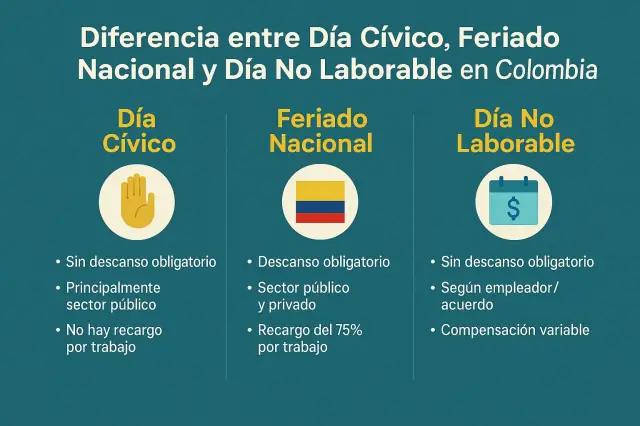In Colombia, confusion is common between the terms "civic day , " "national holiday ," and "non-working day ." Although they may seem similar, each has specific characteristics that affect the rights and obligations of employers and employees. Understanding these differences is essential for proper work planning and ensuring compliance with current legislation.
Find out about Colombia's 2025 calendar here.
What is a Civic Day?
A civic day is a special day decreed by national, departmental, or municipal authorities to commemorate important events or encourage citizen participation in activities of public interest. Unlike national holidays, civic days are not established by law, and their application may vary depending on the territorial entity that decrees them.
Generally, public holidays apply primarily to public sector employees. Private entities have the discretion to decide whether or not to take advantage of the measure. It is important to note that if you work on a public holiday, you are not entitled to an additional salary increase, as the workday is considered ordinary.
What is a National Holiday?
A national holiday is a date established by law to commemorate religious or patriotic events and is considered a mandatory day of rest for all workers, both in the public and private sectors. During these days, those who are required to work are entitled to a 75% salary increase, as stipulated in the Substantive Labor Code.
National holidays are regulated by Law 51 of 1983, known as the Emiliani Law, which moved most holidays to the nearest Monday to promote tourism and productivity. Some holidays, such as January 1 (New Year's Day) and July 20 (Independence Day), are non-movable.
Find out which holidays in Colombia will be moved to Monday in 2025 .
What is a Non-Working Day?
A non-working day is a day on which, by decision of the employer or collective bargaining agreement, work activities are suspended, although it is not stipulated by law as a holiday. These days can be granted for various reasons, such as long weekends, internal company celebrations, or special circumstances.
Compensation for a non-working day depends on the agreement between the employer and the employee. In some cases, it may be granted as a paid day off; in others, it may be compensated with work on another date or deducted from the employee's salary, as agreed upon.
Key Differences Between Civic Day, National Holiday, and Non-Working Day
| Feature | Civic Day | National Holiday | Non-working Day |
|---|---|---|---|
| Legal Basis | Decreed by authorities | Established by law | Employer's decision or agreements |
| Application | Mainly public sector | Public and private sectors | As agreed |
| Mandatory | Not mandatory for everyone | Mandatory | Not mandatory |
| Remuneration | No additional charge | 75% surcharge if you work | It depends on the agreement |
| Frequency | Eventual | Fixed annually | Variable |
You can see the full calendar by visiting this link to learn about all the 2025 holidays in Colombia.
Impact on the Public and Private Sector
In the public sector , civic holidays typically involve the suspension of work activities, except for essential services such as health and safety. In the private sector , the implementation of a civic holiday depends on the decision of each employer, who may choose to adhere to the measure or not.
It is essential that both employers and employees understand the implications of each type of day to ensure compliance with work obligations and avoid misunderstandings or conflicts.
Recommendations for Employers and Workers
- Employers: Inform employees in advance about the implementation of calendar or non-working days and establish clear agreements on remuneration and compensation.
- Employees: Consult with your employer about the company's policy regarding public and non-working days, and know your rights if you work during a national holiday.
Frequently Asked Questions
If I work on a civic holiday, do I have to pay a surcharge?
No. Civic holidays are not considered mandatory rest days, so no additional surcharge applies if you work on these dates.
What happens if my employer doesn't recognize a national holiday?
National holidays are mandatory rest days. If an employer fails to recognize them, they are violating the law and may be subject to sanctions from labor authorities.
Can I refuse to work on a non-working day?
It depends on what you've agreed upon with your employer. If the non-working day was scheduled as a day off, you can refuse to work. However, if there's no prior agreement, it's necessary to talk with your employer to reach a consensus.
Are civic holidays covered by the Substantive Labor Code?
No. Civic holidays are not regulated by the Substantive Labor Code, and their application depends on decrees issued by the competent authorities.
How can I tell if a day is a national holiday?
National holidays are established by law and published annually in the official calendar. You can find them in official sources such as the Ministry of Labor or the Administrative Department of the Civil Service.
